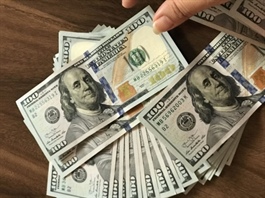Lower interest rates will not have significant impact on inflation
Lower interest rates will not have significant impact on inflation
Reducing interest rates now will not have a significant impact on inflation, according to Dr. Nguyen Tu Anh, director general of the Department of General Economic Affairs at the Central Economic Commission, in a discussion with Angela Nguyen of VIR.
What are your thoughts on the potential reduction of interest rates?
Reducing interest rates is contingent upon the liquidity of the banking system, the perceived risk in the system, and the level of competition from the financial and monetary markets.
The State Bank of Vietnam (SBV) has reduced the interest rate four times in succession over the past few years, and the interest rate on the interbank market is now close to zero, while the overnight interest rate is only 0.22 per cent.
This indicates that banks have excess liquidity, as the need to borrow from one another to balance liquidity is minimal. This is a prerequisite for banks to lower their lending rates.
When there is excess liquidity, it is evident that commercial banks are in high demand for loans to reduce capital costs. However, during the period when COVID-19 impacted the economy, there was also an excess of liquidity, but the interest rate did not decrease significantly due to the perception of elevated economic risk. Therefore, in order for interest rates to fall, economic risk is a necessary condition. Competition in the banking and financial markets will determine the degree of interest rate reduction.
In the first quarter of this year, Vietnam's economic growth was low, the economy's risk aversion grew, and the hedging component of lending interest rates also rose, so interest rates remained elevated. However, the data for the second quarter indicates that the market situation is improving. The second quarter growth rate was considerably higher than the first quarter's rate of 3.28 per cent.
According to the General Department of Taxation, the number of businesses continuing operations in the first half of the year grew by 21.15 per cent compared to the same period in 2022, while the number of businesses ceasing operations and suspending operations fell by 15.57 per cent and 13.6 per cent, respectively.
Although the number of newly established businesses rose by only 0.6 per cent, these indicators demonstrate that the business environment is improving, and that market risks have decreased substantially. Therefore, now is the perfect moment for commercial banks to contemplate further lowering interest rates to promote economic recovery and increase profits.
Will inflation ever be a constraint on Vietnam's interest rate reduction?
In China, it is paradoxical that when interest rates are lowered and the money supply is increased, deflation occurs instead of inflation. This demonstrates that money outflows are impacted by extremely low interest rates and do not contribute to inflation.
Vietnam should not be overly concerned about inflation, but should continue to maintain high interest rates. In reality, Vietnam's average inflation during the first half of the year increased by only 3.29 per cent, which is quite low compared to the National Assembly's target of 4.5 per cent for this year.
Do you believe that if interest rates exceed 10 per cent, businesses will not be able to operate?
According to SBV data, the average credit balance for the entire year of 2022 was $4.8 billion, with an average lending interest rate of 10 per cent per year, and the interest that Vietnamese enterprises and individuals paid was $4.8 billion, or almost 12 per cent of GDP.
Based on the 2023 economic growth goal of approximately 6.5 per cent and the inflation of around 4.5 per cent set by the National Assembly and the government, the SBV anticipates a credit growth rate of approximately 14–15 per cent in 2023.
For businesses operating in sectors with rapid capital turnover, an interest rate of at least 10 per cent will have little impact on their capacity to operate, as the cost of capital for a month is under 1 per cent if the capital turnover is less than one month.
But for enterprises in the manufacturing sector, especially those with large investments and sluggish capital turnover, interest rates above 10 per cent will be a significant obstacle, especially if they are to compete with foreign business whose interest rates are only about 5 to 6 per cent.
Due to low self-capitalisation, an unstable corporate bond market, and a volatile stock market, Vietnamese businesses rely heavily on bank loans to operate; consequently, high interest rates will severely limit their profitability.
If the interest rate this year is 10 per cent, the cost of capital for companies would reach $54.9 billion, or 12 to 13 per cent of GDP. If the lending interest rate decreases by 1 percentage point between now and the end of the year, it would be equivalent to a reduction of $5.49 billion for businesses, which is five times greater than the state's support to reduce VAT by 2 percentage points. This would be a tremendous boost for businesses.
Is it time, as you suggest, for the market to self-regulate?
In essence, the interest rate is the selling price of financial institutions' capital, and the market will regulate the selling price in accordance with the norms of competition. To ensure robust market competition, it is the responsibility of the state to ensure that competition laws are enforced. Everyone will benefit from competition, as it will help financial institutions grow stronger and give consumers access to financial services at lower cost.





















